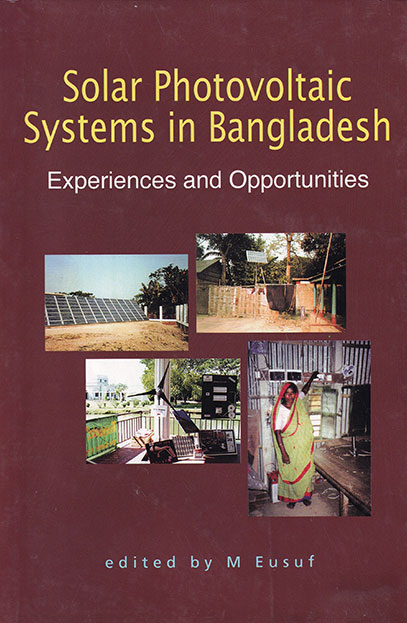- Shop
- Technology and Engineering
- Solar Photovoltaic Systems in Bangladesh - Experiences and Opportunities
Solar Photovoltaic Systems in Bangladesh - Experiences and Opportunities
https://uplbooks.com/shop/9789840517329-solar-photovoltaic-systems-in-bangladesh-experiences-and-opportunities-6632 https://uplbooks.com/web/image/product.template/6632/image_1920?unique=90f5a49
| Language: English |
Tags :
Book Info
Photovoltaic technology has emerged as one of the methods of accessing energy for low level consumption. The systems use solar energy for generation of electricity. Since solar energy is available everywhere, this technology should serve as a great booster for rural electrification. There is no fuel cost or moving parts in this system, resulting in quiet functioning leading to durability and a soundless environment. Since 1980, a number of organizations in Bangladesh have been involved in research, development and diffusion of PV systems, but penetration among the users has been very slow. It is against this backdrop that, Bangladesh Centre for Advanced Studies (BCAS) and Local Government Engineering Department (LGED) brought together some leading national and international experts, policy planners and development agencies in Dhaka in May, 1999 to develop a strategy for accelerating the dissemination of solar PV systems. This volume brings together the presentations, dialogues, open discussions and a consensus report on the recommendations. In a span of 22 chapters, this book records the present progress and proposes future steps to be taken for popularization of the use of solar energy in Bangladesh. It calls for coordination among the stakeholders in the promotion of technologies and the development of local entrepreneurship by establishing financing institutions such as a Renewable Energy Development Fund and an appropriate agency. The authors emphasize the need for a collective effort by NGOs, donor agencies and media support which would result in increased awareness and social mobilization in the dissemination of this environmentally friendly technology. The book concludes with a series of recommendations and follow-up steps for the sustainability of the solar PV system and the essential need for a power need matrix.

M Eusuf
M. Eusuf is currently working as a Senior Fellow and Head of Energy Division in Bangladesh Centre for Advanced Studies (BCAS). He is the Bangladesh Team Leader of the ADB sponsored project Renewable Energy, Energy Efficiency and Greenhouse Gas Abatement (PREGA). Dr. Eusuf has been associated with research, development and dissemination of energy technologies at Bangladesh Council of Scientific and Industrial Research (BCSIR) since 1964. He has published numerous research and review papers in national and international journals. He has to his credit 12 patents on energy technologies and 5 technologies leased out for commercial exploitation. Under his guidance technologies of renewable energy have been developed and these are now being disseminated by BCSIR in the rural areas. He has

এম ইউসুফ
M. Eusuf is currently working as a Senior Fellow and Head of Energy Division in Bangladesh Centre for Advanced Studies (BCAS). He is the Bangladesh Team Leader of the ADB sponsored project Renewable Energy, Energy Efficiency and Greenhouse Gas Abatement (PREGA). Dr. Eusuf has been associated with research, development and dissemination of energy technologies at Bangladesh Council of Scientific and Industrial Research (BCSIR) since 1964. He has published numerous research and review papers in national and international journals. He has to his credit 12 patents on energy technologies and 5 technologies leased out for commercial exploitation. Under his guidance technologies of renewable energy have been developed and these are now being disseminated by BCSIR in the rural areas. He has



